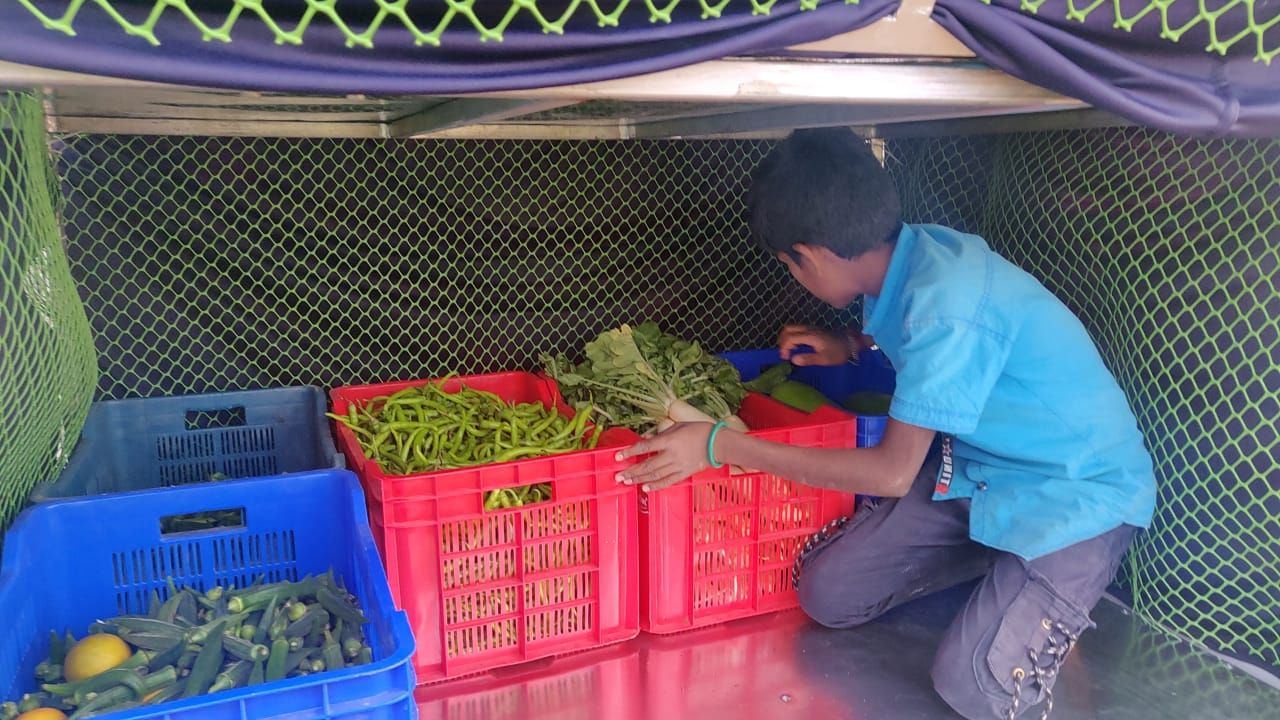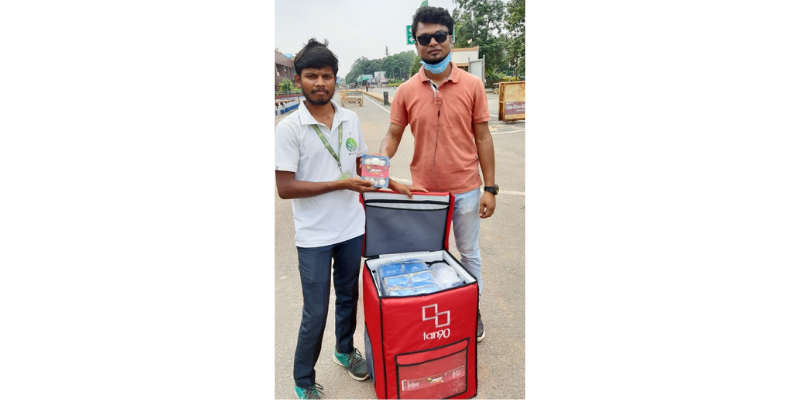According to UN’s Food and Agriculture Organization, post-harvest losses in India amount to around 40 percent of the agricultural produce , running into a whopping Rs 1 lakh crore. For a country ranked 94th among 107 nations on the Global Hunger Index, it’s a crime of the worst order. These losses can be attributed to inadequate storage facilities and logistical solutions. Farmers growing horticultural crops suffer bigger setbacks because of the limited shelf life of fruits and vegetables. The lack of access to cold storage infrastructure and refrigerated vehicles forces them to sell their produce at shockingly low prices. Even then, every year they collectively end up losing Rs 63,000 crore due to the wastage. Financial losses aside, it’s also a waste of precious resources like water. Crop losses have translated into an alarming prevalence of malnutrition in the families of small and marginal farmers.
Cold storages have the potential to transform agriculture, making it sustainable and profitable for even smallholder farmers. With robust storage facilities, including post-harvest management, farmers can concentrate on high value crops. They will be empowered to decide when to sell, leading to better price realisation of their produce as demand picks up. This would help them break free of the stranglehold of intermediaries in the supply chain. In fact, state and central schemes to boost the network of cold storage facilities can play a catalytic role in improving farmers’ incomes.
Uneven distribution of cold chains amidst rising demand
As rapid urbanisation and changing food habits diversify the consumption of meat , dairy products, fruits, and vegetables, the demand for a robust cold chain infrastructure, including pack houses, ripening chambers and temperature-controlled transportation is bound to increase. As per the National Centre for Cold Chain Development’s (NCCD) estimates, there is a shortfall of 126 lakh tons of cold storage capacity in the country. There is also an acute dearth of ripening chambers, refrigerated transport, and rural packhouses. In its gap-analysis report, the Integrated Cold Chain Availability Platform estimates that India has only 500 rural packhouses against the need of over 125,000 such facilities .
The food processing industry is expanding rapidly in terms of production, growth, consumption, and export. And, the Union Ministry of Food Processing Industries appreciates the need for an “unbroken chain of integrated cold chain and preservation infrastructure facilities from the farm gate to the consumer.” This demands a network of refrigerators, cold storage facilities , refrigerated trucks, freezers and cold boxes to keep the perishable items fresh during transportation, storage, and distribution. Such an elaborate and intricate operation requires an active involvement of various stakeholders — from private companies to big corporations and central and state PSUs to farmer producer organisations and NGOs.
However, cold storages in India are primarily designed for bulk, single-temperature and long-term warehousing of crops, especially for potatoes, which are stored in the majority of the 8,186 facilities in the country. The rest are utilised for multi-commodity storage even when the production of high-value crops is on the rise.
The uneven distribution of cold storages – with Uttar Pradesh, Gujarat, Punjab, Maharashtra, and West Bengal hosting most such facilities – is driven by a host of factors including the nature of crops produced, and the irrigation network. “Irrigated agriculture is not solely dependent on rain. It assures volume and cropping intensity, with farmers diversifying into high value crops,” says Sujit Kumar Gopinathan, the Gujarat team leader of Collectives for Integrated Livelihood Initiatives (CInI), a nodal agency of Tata Trusts.
“Given the high capital and operational costs of refrigerated warehouses, cold storage owners aim for optimal utilisation. So, maximum storage facilities are built to house potatoes and tomatoes that are harvested in massive quantities. Single-crop geographies lack big volumes, making them unattractive for big spaces,” he adds.
Need for decentralised, customised solutions
India’s cold storage solutions display a ‘one-size-fits-all’ approach. “Decentralised and customised solutions, keeping in mind the local needs, are ideal for a vast and diverse country like ours with different climatic zones,” says Sujit, adding that small multi-temperature storage facilities for high-value fruits, flowers, vegetables, fish and poultry closer to the farmgate can minimise significant amount of wastage.
The other big problem that ails cold storage chains is an unreliable power supply. Indian cold storages mostly depend on grid electricity. As a result, an unreliable power supply in rural India, rising costs of electricity and dependence on conventional fuels limit operations, expansion and decentralisation of the cold storage industry.
India needs energy-efficient solutions for the sustainable development of cold storages across the country. Several projects are exploring renewable and alternative energy options, such as solar PV systems, solar thermal systems, biomass gasifier and phase change materials, (PCM) but their efficiency will determine the adoption of technology.
Tan90, a success story
The success of Social Alpha portfolio company Tan90 Thermal Solutions Private Limited underscores the need for democratising and decentralising cold storages in India with smart solutions. The startup offers a range of temperatures through its unique innovation of cooling chemicals (Phase Change Material - PCM) that freezes three times faster than ordinary gel packs. No wonder, Tan90’s end-to-end cold storage solutions, including the EVAP90 — a metallic frame covered by a specialised membrane that enables evaporative-based cooling at the farmgate — and portable bags and boxes are much sought after in various sectors like agriculture and allied industries for storage and transportation.

Tan90’s EVAP90 - a metallic frame covered by a specialized membrane - allows evaporative based cooling at the farmgate
“Right now, we have multi-commodity cold storage options ranging from 15 degree centigrade to -24 degree centigrade, with intermediate categories of 4 degrees centigrade, -2, -4, -8, and -16 degrees centigrade,” says Soumalya Mukherjee, who founded Tan 90 along with Rajanikant Rai and Shiv Sharma.
Under Krishi Mangal – a joint initiative of Social Alpha and Cisco India CSR to foster the wellbeing and prosperity of smallholder farmers through deep-tech innovations – the Chennai-based company will be working closely with five Farmer Producer Organisations (FPOs) in Andhra Pradesh and five in Telangana, giving out 100 EVAP90, 80 bags, and 65 boxes to those FPOs dealing in highly perishable items like fruits and fish, that will benefit around 5,500 farmers. Outside of the programme, FPOs in Karnataka, Tamil Nadu, Rajasthan, UP, West Bengal, and Gujaratbuying Tan90 products have observed a payback period of less than six months depending on the perishable goods being transported.

Under the Krishi Mangal initiative, Tan90 has given out 100 EVAP90, 80 bags, and 65 boxes to FPOs dealing in highly perishable items like fruits and fish that will benefit 5,500 farmers
Tan90 has formed a consortium with two enterprises to offer end-to-end solutions and rein in post-harvest losses as part of the Krishi Mangal initiative. “Though we are providing the cold storage infrastructure, that alone may not be enough. We also realised the importance of firming up the market linkage. This linkage is provided by Greenbliss Agro, an FPO accelerator with 150 FPOs spread across Andhra Pradesh, Telangana and UP , under its umbrella,” says Soumalya. The third partner in the troika, DbyT Dynamics, ensures timely delivery of the produce to other aggregators and consumers with its fleet of electric vehicles.
“Interestingly, our solutions are being availed by smallholder farmers in states, which already have a robust cold storage infrastructure in place. This shows that more than giant, centralised cold storages, smallholder farmers need low-cost and customised options,” says Rajanikant.
“Tan90’s modular design, cost-effective and energy-efficient systems have successfully overcome the challenges of transporting temperature-sensitive items and bridging the last-mile delivery gap. Infrequent, poor quality or expensive transport services always result in low farm gate prices,” says Shiv, adding that small scale producers do not have to depend on expensive means of transport to reach the market.
Tan90 solutions have benefitted flower farmers near Chennai who could cut down on labour costs by one-third, with each grower saving about Rs 4,500 per month. Fisheries too were happy for being able to reduce dependency on ice, when they began using only 2 kgs instead of 14 kgs for a 40-litre icebox.
Two more Social Alpha-backed startups, New Leaf Dynamic and Devidayal Solar Solutions, have devised renewable energy-based solutions that have the potential to reduce post-harvest losses and find new markets for farmers.
Using GreenCHILL, a vapour adsorption cycle-based refrigeration system powered by biomass, the founders of New Leaf Dynamic - Akash Agarwal and Anurag Agarwal - have created this off-grid solution for cooling fruits, vegetables, flowers and milk, at the village or farm level.
GreenCHILL comes with multipurpose applications including pre-cooler, ripening, and mushroom-growing chambers, dryer unit, air-conditioning, icemaker and a bulk milk chiller. It can also be used in remote hilly locations.
Devidayal’s Solar DC Refrigerator is ideal for storing dairy, food and drinks. Available in 100-litre and 268-litre models, these off-grid mobile cooling solutions are being leveraged to build supply chain solutions in agriculture and allied sectors. According to founder Tushar Devidayal, the startup has empowered women entrepreneurs and farmers to explore new markets by creating a cold chain ecosystem with truck mounted solar refrigerators and a smartphone-based demand and distribution system.
“Despite the boom in AgriTech funding , the cold storage space has seen limited investments due to its capex-heavy nature and the long gestation period of startups. At Social Alpha, we strongly believe that investing in affordable, decentralised cold-storage technologies is the need of the hour. Post-harvest technologies near farmgate or those catering to the needs of smallholder farmers have the ability to improve farmer incomes and at the same time reduce food loss. Social Alpha is willing to bet on such high-risk startups committed to solving some of the most complex challenges in India’s agricultural landscape,” says Nikhita Nadkarni, Portfolio Director – Agritech, Social Alpha.”
Social Alpha is a multistage innovation curation and venture development platform for science and technology startups that address the most critical social, economic and environmental challenges through the power of entrepreneurship and market-creating innovations
Link : https://yourstory.com/2021/07/tan90-warming-up-decentralised-cold-storage-solutions
Author :- Social Apha AgriTech Team ( )
July 29, 2021 at 09:41AM
YourStory
